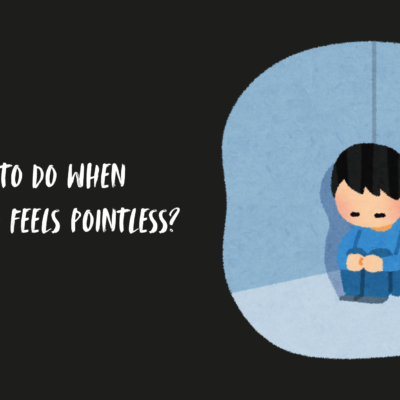What to Do When Everything Feels Pointless: There are moments in life when everything feels pointless. You may feel unmotivated, disconnected, and lost, wondering why you even bother with your daily responsibilities, relationships, or personal goals. This feeling can arise due to stress, disappointment, depression, burnout, or a lack of fulfillment. While these emotions can be overwhelming, it is important to remember that they are temporary and manageable.
If you’re struggling with a sense of meaninglessness, this article will help you understand why you feel this way and provide actionable steps to help you regain clarity, motivation, and a renewed sense of purpose.
Also Read:
What to Do When Everything Feels Pointless?
1. Understanding Why You Feel This Way
Before taking action, it’s important to identify the root cause of your feelings. Some common reasons why everything might feel pointless include:
A. Burnout and Exhaustion
Constant stress, overwork, and lack of rest can lead to emotional and physical exhaustion, making everything feel overwhelming and meaningless.
B. Depression or Mental Health Struggles
Feeling like nothing matters can be a symptom of depression or other mental health conditions. If these feelings persist, seeking professional help is crucial.
C. Lack of Purpose or Direction
If you don’t have clear goals or a sense of meaning in life, you may feel lost and unmotivated.
D. Unfulfilled Expectations
When reality doesn’t match your expectations, it can lead to disappointment and a loss of enthusiasm for life.
E. Isolation and Loneliness
A lack of meaningful social connections can make life feel empty. Human beings thrive on relationships, and feeling disconnected can contribute to hopelessness.
F. Trauma or Major Life Changes
Loss, failure, or unexpected life changes can shake your sense of purpose and make it difficult to find meaning in everyday activities.
Once you understand the possible reasons behind your feelings, you can start addressing them step by step.
2. What to Do When Everything Feels Pointless
A. Acknowledge and Accept Your Feelings
The first step is to allow yourself to feel without judgment. Instead of suppressing or ignoring your emotions, try to acknowledge them.
- Tell yourself, “It’s okay to feel this way. These feelings are valid, and they will pass.”
- Avoid self-criticism. Feeling lost or unmotivated doesn’t mean you’re weak or broken.
B. Take a Break and Rest
Sometimes, the feeling of pointlessness comes from burnout or mental fatigue. If you’ve been overworking, constantly worrying, or dealing with high stress, give yourself permission to rest and recharge.
- Take a day off or schedule some quiet time for yourself.
- Engage in relaxing activities like reading, meditating, taking a walk, or listening to music.
- Prioritize sleep, hydration, and proper nutrition—your mental state is deeply connected to your physical well-being.
C. Connect with Loved Ones
Isolation can make the feeling of meaninglessness worse. Reach out to people you trust—friends, family members, or even an online community.
- Talk to someone about how you feel.
- Spend time with supportive people, even if you don’t feel like it.
- Engage in social activities, even small ones like a coffee meetup or a casual phone call.
Human connection helps bring perspective, comfort, and encouragement when you’re feeling low.
D. Do Something Small and Manageable
When everything feels pointless, even basic tasks can seem overwhelming. Instead of trying to solve everything at once, start with small, manageable actions.
- Clean your room or organize a small space.
- Go for a short walk outside.
- Write down three things you’re grateful for.
- Make a simple meal or drink a cup of tea mindfully.
Taking small actions can help shift your mindset and create momentum for bigger changes.
E. Change Your Routine or Environment
Sometimes, the monotony of life contributes to feelings of meaninglessness. Try to introduce something new or different into your routine:
- Visit a new place, even if it’s just a park or a café.
- Start a new hobby or activity.
- Change your workspace or rearrange your living space.
A fresh experience, no matter how small, can break the cycle of hopelessness and spark new perspectives.
F. Focus on Meaning, Not Motivation
When life feels pointless, it’s hard to find motivation. Instead of relying on motivation, focus on finding small sources of meaning in everyday life.
- Ask yourself: “What small thing can I do today that matters?”
- Engage in an activity that once brought you joy, even if you don’t feel like it right now.
- Volunteer or help someone—acts of kindness create a sense of purpose.
Even in difficult times, there are moments of meaning to be found.
G. Limit Negative Influences
Your mental state is influenced by what you consume and surround yourself with. If certain things are making you feel worse, distance yourself from them:
- Reduce social media use if it’s causing comparison or negativity.
- Avoid toxic people who drain your energy.
- Take a break from negative news that adds to stress.
Instead, focus on uplifting books, music, or conversations that bring you a sense of hope and clarity.
H. Seek Professional Help if Needed
If your feelings of pointlessness persist for a long time, it might be helpful to talk to a therapist or counselor. Mental health professionals can help you:
- Identify deeper emotional patterns.
- Develop coping strategies.
- Find new perspectives on meaning and purpose.
Seeking help is not a sign of weakness—it’s a step toward healing and self-care.
3. Finding Long-Term Meaning in Life
Beyond dealing with immediate feelings of pointlessness, you can start working toward a long-term sense of purpose and fulfillment.
A. Reconnect with Your Passions
Think about what used to excite or inspire you. What activities made you feel alive? Start reintroducing them into your life.
B. Set Small Goals
Purpose comes from progress. Set tiny, achievable goals that give you a sense of direction.
C. Practice Gratitude
Regularly write down things you’re grateful for—even small joys. Gratitude helps shift focus from emptiness to appreciation.
D. Help Others
Helping someone in need—whether through volunteering, listening, or small acts of kindness—can create a deep sense of meaning and fulfillment.
E. Accept That Life’s Meaning Can Change
Sometimes, we feel lost because we expect life to always have a clear, fixed purpose. But meaning evolves. Instead of searching for a single “grand purpose,” focus on creating meaning in the present moment.
Conclusion
Feeling like everything is pointless is a painful experience, but it is not a permanent state. By acknowledging your feelings, taking small steps, connecting with others, and making gradual changes, you can rebuild a sense of meaning and purpose.








